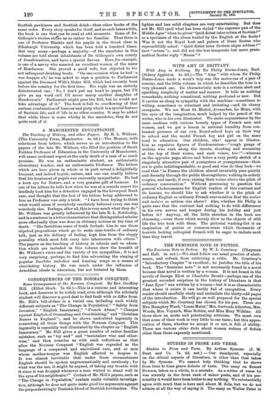Some Consequences of the Norman Conquest. By Rev. Geoffrey Hill.
(Elliot Stock. 7s. 6d.)—This is a curious and interesting book, and deserves to be widely read, even although the scholarly student will discover a good deal to find fault with or differ from. Mr. Hill's bill-of-fare is a varied one, including such widely different subjects as "The Change in Population," "Safety from Invasion," " English Inaccuracy," " French Abuse," " Charges against English of Overeating and Overdrinking," and " Christian Names in England" ; and he shows undoubted ingenuity in connecting all these things with the Norman Conquest. This ingenuity is especially well illustrated by the chapter on " English Inaccuracy." Mr. Hill gives a great number of rather familiar mistakes, such as "try and" and "teetotalers wise and other- wise," and then consoles us with such reflections as that after the Norman Conquest "English was regarded as the language of a conquered and uncivilised race, and so men whose mother-tongue was English affected to despise it. It was almost inevitable that under these circumstances English should be spoken ungrammatically and carelessly ; for what was the use, it might be argued, of taking any trouble with it since it was dropped whenever a man wished to stand well in the eyes of his neighbours ?" Certain of Mr. Hill's papers, such as " The Change in Population," contain really valuable investiga- tion, although he does not quite make good his arguments against the preponderatingly Teutonic blood of Scottish Lowlanders. The lighter and less solid chapters are very entertaining. But does not Mr. Hill spoil what has been styled " the supreme pun of the Middle Ages" when he gives "Quid distat inter sotum at Scotum?" as a specimen of the abuse hurled by the English at the Scota ? Was it not the Royal host and patron of Dims Scotus who reproachfully asked : " Quid distat inter Scotum atque Bottum ?" (not "sotum ") ; and did not the less temperate but more gram- matical Scotus reply " Meuse. " ?






















































 Previous page
Previous page